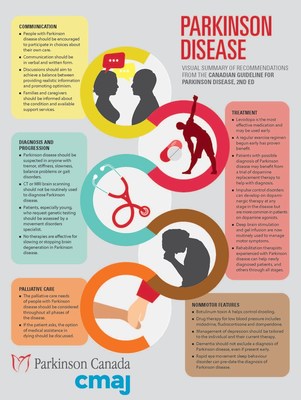New guideline for Parkinson's disease aims for clear communication and standardized care for the Parkinson's community
Includes new non-motor, palliative care, and treatment advances
TORONTO, Sept. 9, 2019 /CNW/ - A comprehensive new Canadian Guideline for Parkinson Disease, 2nd Edition, provides practical guidance for physicians, allied health professionals, people with Parkinson's and families on disease management. CMAJ (Canadian Medical Association Journalwww.cmaj.ca) published the new guideline accompanied by an easy-to-reference infographic and podcast.

Parkinson's is a debilitating, progressive neurological disease that affects quality of life for those diagnosed and their caregivers.
Since publication of the first Canadian guideline in 2012, there have been significant advancements in Parkinson's disease. The new guideline, sponsored by Parkinson Canada, shows the latest evidence and advances in diagnosis, treatment and symptom management; the guideline contains a new section on palliative care. An interdisciplinary team of experts from across Canada helped develop the second edition including 13 new recommendations, which consolidate new evidence and address gaps.
"Depression and anxiety are common symptoms of Parkinson patients and can be harder to recognize. Physicians should feel more comfortable with treating the depression and anxiety as these directly impact the quality of life of people with Parkinson's and their caregivers," says Dr. David Grimes, lead author of the Canadian Guideline for Parkinson Disease and Division Head, Neurology, The Ottawa Hospital, University of Ottawa Brain and Mind Research Institute.
"Our message to individuals is 'don't wait.' There are professionals who can directly improve a person's quality of life through early and regular intervention," says Joyce Gordon, Parkinson Canada CEO. "There is a lot a person can do now to live life to the fullest, working together with their healthcare team to mitigate symptoms and improve health outcomes," she adds.
The guideline includes 97 recommendations divided into five sections for ease of use:
- Communication (including families and caregivers)
- Diagnosis and progression
- Treatment
- Non-motor features
- Palliative care
"A limitation to implementing the guideline is the lack of access to healthcare providers experienced in caring for people with Parkinson's disease," says Dr. Grimes. "In addition to specialist physicians, we need more nurses, and speech, occupational and physical therapists with training in this area, as well as appropriate palliative care for Parkinson patients."
"The guideline provides evidence-based recommendations to improve the overall standard of care of individuals with Parkinson disease in Canada, not only for healthcare professionals but also for policy makers, patients themselves and their caregivers," writes Dr. Veronica Bruno, Department of Clinical Neurosciences, Movement Disorders Program and Hotchkiss Brain Institute, University of Calgary, and coauthor in a related commentary https://bit.ly/2lvRkWy.
Parkinson's is a complex disease that requires clear, standardized procedures to manage effectively. The disease affects not only those diagnosed, but also those in their family, work and social circles. More than 100,000 Canadians are diagnosed with Parkinson's disease and related conditions.
About Parkinson Canada
Parkinson Canada provides services and education to people living with Parkinson's disease, their families, and the healthcare professionals who treat them. Operating since 1965, the organization advocates with federal, territorial and provincial governments on issues that concern the Parkinson's community in Canada. The Parkinson Canada Research Program funds innovative research for better treatments and a cure. Parkinson Canada is a founding partner of the Canadian Open Parkinson Network. C-OPN will increase collaboration across institutions and scientists to accelerate discoveries through a shared databank and biorepository. A national registered charity, Parkinson Canada operates through the generosity of donors and is an accredited organization under the Imagine Canada Standards Program since 2013. Parkinson Canada participates in numerous coalitions and partnerships to fulfil its mission.
Supplementary information:
Guideline http://www.cmaj.ca
Infographic https://bit.ly/2k1VUM0
Podcast link https://soundcloud.com/cmajpodcasts/181504-guide
Website http://www.parkinsonclinicalguidelines.ca
Twitter https://twitter.com/parkinsoncanada #communication #palliative #non-motor

SOURCE Parkinson Canada
